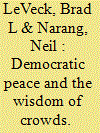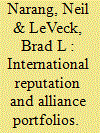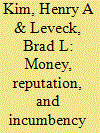|
|
|
Sort Order |
|
|
|
Items / Page
|
|
|
|
|
|
|
| Srl | Item |
| 1 |
ID:
134979


|
|
|
|
|
| Summary/Abstract |
Why do some decision makers prefer big multilateral agreements while others prefer cooperation in small clubs? Does enforcement encourage or deter institutional cooperation? We use experiments drawn from behavioral economics and cognitive psychology—along with a substantive survey focused on international trade—to illustrate how two behavioral traits (patience and strategic reasoning) of individuals who play key roles in negotiating and ratifying an international treaty shape their preferences for how treaties are designed and whether they are ratified. Patient subjects were more likely to prefer treaties with larger numbers of countries (and larger long-term benefits), as were subjects with the skill to anticipate how others will respond over multiple iterations of strategic games. The presence of an enforcement mechanism increased subjects' willingness to ratify treaties; however, strategic reasoning had double the effect of adding enforcement to a trade agreement: more strategic subjects were particularly likely to favor ratifying the agreement. We report these results for a sample of 509 university students and also show how similar patterns are revealed in a unique sample of ninety-two actual US policy elites. Under some conditions certain types of university student convenience samples can be useful for revealing elite-dominated policy preferences—different types of people in the same situation may prefer to approach decision-making tasks and reason through trade-offs in materially different ways
|
|
|
|
|
|
|
|
|
|
|
|
|
|
|
|
| 2 |
ID:
157550


|
|
|
|
|
| Summary/Abstract |
This article proposes a new theory for the democratic peace that highlights a previously unexplored advantage enjoyed by democracies in crises. We argue that because democracies typically include a larger number of decision-makers in the foreign policy process, they will produce fewer decision-making errors in situations of crisis bargaining. Thus, bargaining among larger groups of diverse decision-makers will fail less often. In order to test our hypothesis, we use data from experiments in which subjects engage in ultimatum bargaining games. We compare the performance of individuals, small groups and foreign policy experts against the performance of larger groups of decision-makers. We find strong support for the idea that collective decision-making among larger groups of decision-makers decreases the likelihood of bargaining failure.
|
|
|
|
|
|
|
|
|
|
|
|
|
|
|
|
| 3 |
ID:
166000


|
|
|
|
|
| Summary/Abstract |
Why do states ever form military alliances with unreliable partners? States sign offensive and defensive military alliances to increase their fighting capabilities in the event of war and as a signal to deter potential aggressors from initiating a crisis. Yet, signing an alliance with an unreliable partner is at odds with both of these rationales. This should be particularly concerning for peace scholars and policymakers, since the uncertainty generated by unreliable partners may increase system-wide conflict. This article provides an answer to this puzzle by arguing that states continue to form alliances with unreliable partners because they can adopt rational portfolio-diversification strategies. Drawing on well-developed models from portfolio theory, we present evidence that states design their overall alliance portfolios to minimize the risks posed by allies with a reputation for being unreliable. Specifically, we show that unreliable allies are more likely to be pooled into multilateral alliances that dilute risk rather than bilateral alliances, and that states allied with unreliable partners form a greater number of alliances to hedge against the added risk of default. Together, our results demonstrate why unreliable partners may not lead to increased conflict initiation, while also providing a novel explanation for previously unexplained variation in the structure of alliance portfolios. The article contributes to the literatures on international reputation and the rational design of international institutions by demonstrating how international reputation matters in subtle and often overlooked ways.
|
|
|
|
|
|
|
|
|
|
|
|
|
|
|
|
| 4 |
ID:
127793


|
|
|
|
|
| Publication |
2013.
|
| Summary/Abstract |
Since 1972, campaign spending by House incumbents has skyrocketed, particularly in those districts with marginal support for the incumbent's party. At the same time, parties in the House have become much more cohesive in the way they vote, producing more precise and informative party brands. We argue that these two phenomena are fundamentally linked. As parties have developed more precise reputations, incumbents in these districts must spend much more to attract voters in "marginal" districts, who would be willing to vote for a candidate with the particular incumbent's legislative record, but not the average member of his party. Increasingly precise party reputations provide voters with stronger priors that incumbents are just like the rest of their party, and incumbents in marginal districts must spend more to overcome these beliefs. We demonstrate this using a simple formal model and test it empirically using campaign-spending data from 1972 to 2008.
|
|
|
|
|
|
|
|
|
|
|
|
|
|
|
|
| 5 |
ID:
153921


|
|
|
|
|
| Summary/Abstract |
Why would leaders engage in international cooperation if they believe that their own government might default from their commitments? Some suggest that when leaders do so, they are essentially trying to profit from false promises—from making international commitments that they likely cannot, or will not, actually fulfill. In contrast, others expect that fears of such non-compliance will deter leaders from engaging in international cooperation. Moreover, some theories suggest that the design of cooperative agreements themselves should affect how leaders respond to these possibilities. That is, leaders should be more concerned about the prospect of their country’s non-compliance with agreements that impose, through formal means, sizeable costs on recalcitrant states. We describe the results of an experimental survey conducted on 95 high-level policy elites in the United States that allows us to examine the causal dynamics that underlie this debate. We focus on one key institutional design feature—formal enforcement—and preferences for international cooperation under different perceptions of risk about future compliance. We provide the first elite-level evidence that, as the prospect of defection rises, actual policymakers become less willing to join international agreements. However, contrary to what many theories of international institutions would predict, the presence of a formal enforcement mechanism fails to explain their aversion to cooperation. Elites dislike making false promises even when their commitments are not formally enforceable. By measuring these elites’ patience (along with other traits), we tentatively suggest that this aversion may be linked to decision-makers’ own perceptions of the future—elites who have lower discount rates are particularly sensitive to the prospect of not honoring commitments.
|
|
|
|
|
|
|
|
|
|
|
|
|
|
|
|
|
|
|
|
|